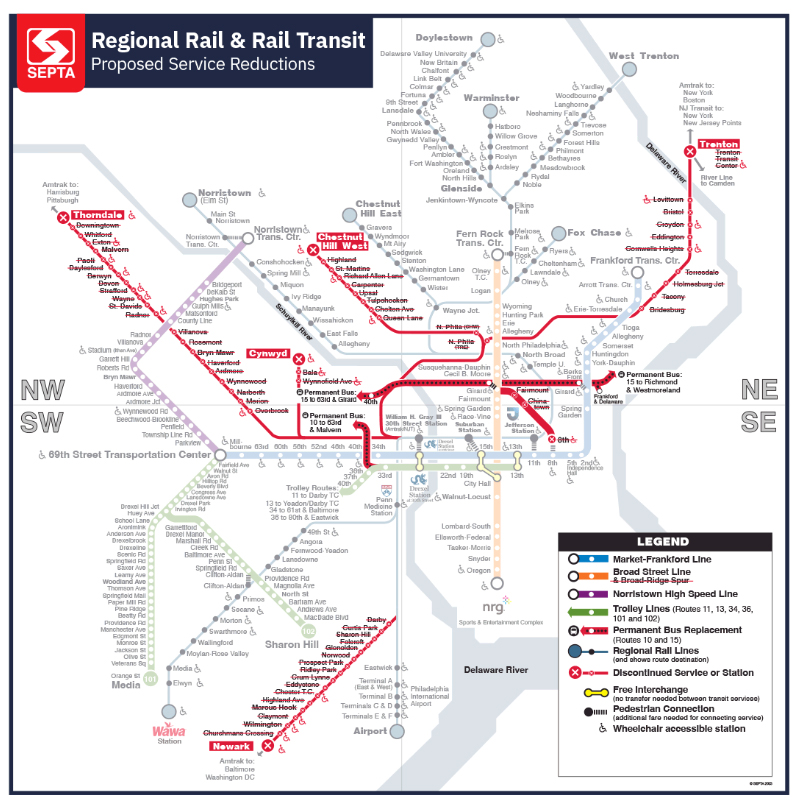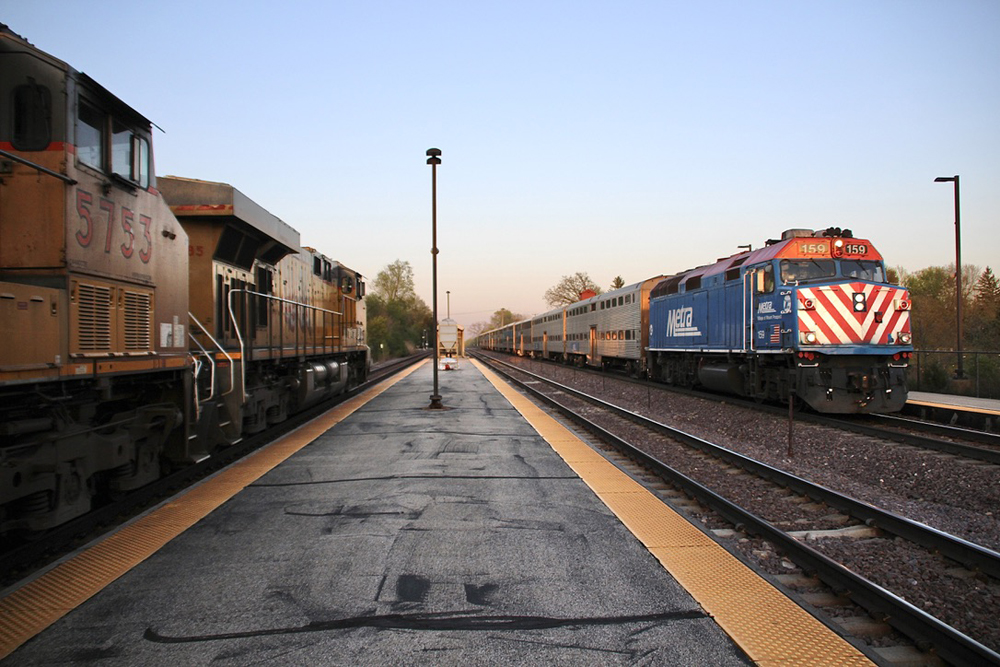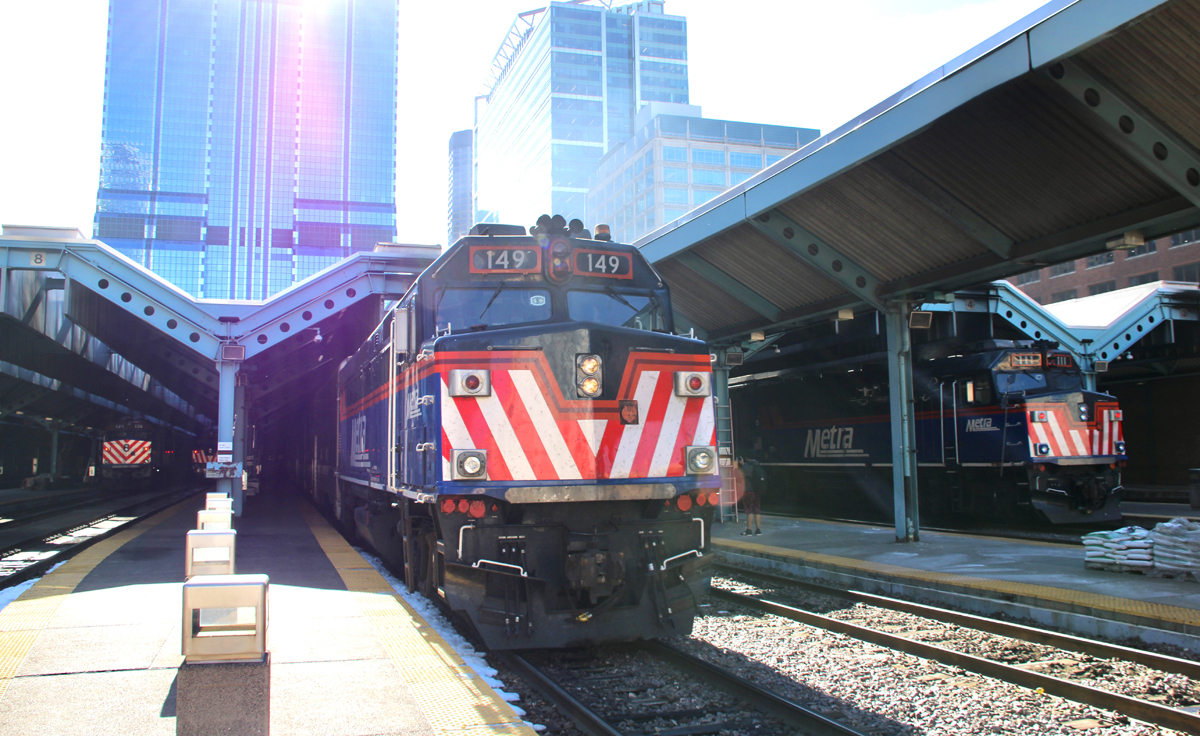
PHILADELPHIA — The City of Philadelphia has announced measures it will take when the Southeastern Pennsylvania Transportation Authority begins enacting major service cuts this Sunday (Aug. 24, 2025).
Meanwhile, New Jersey Gov. Phil Murphy has announced new transit options for those in neighboring South Jersey.
“We all know the best way to keep the region moving and to keep the local and state economy going will be for SEPTA to be fully funded in the State budget,” Mike Carroll, the city’s deputy managing director, transportation and infrastructure, said in a press release. “Of course, there is no substitute for SEPTA, but in the meantime, we must adapt to new patterns of travel.”
Moves by the city include working with SEPTA and others to ensure travelers have the most useful resources for trip planning, plans for the Department of Streets to monitor rush-hour traffic and preparing to increase management of major streets and intersections, and identifying park-and-ride options for those in outlying communities. Details including planning resources are available on a city blog dedicated to the SEPTA situation; the city says the blog will be updated frequently.
Mayor Cherelle L. Parker said the city continues to be option the SEPTA funding crisis will be resolved, and noted that the city has provided $792 million for SEPTA operating and capital funds as part of a budget and five-year plan passed in June. The city is also working with the School District of Philadelphia to address student transportation that will be disrupted by the cuts.
“For Philadelphia, Montco, Delco, Bucks, and Chester, this is about our economic survival, our quality of living, how we serve as the foundation of the economy for the entire Commonwealth,” Parker said.
SEPTA’s first round of cuts beginning Sunday will include elimination of 32 bus routes and reduced frequencies for rail service, to be followed by a 21.5% fare increase on Sept. 1. Additional cuts set for January 2026 will see some Regional Rail routes eliminated.
The agency faces a budget deficit of more than $200 million; potential state funding to address the issue remains caught in a legislative deadlock that has lawmakers more than 50 days past their deadline to produce a budget for the 2025-26 fiscal year. Transit funding is a significant element of that deadlock; the Democrat-controlled House has passed a bill allotting more than $292 million for transit statewide, with finding from sales tax, while the Republican-controlled Senate has called for the same amount of funding, but would draw most of the money from a fund for transit capital projects. [See “SEPTA begins preparing for service cuts …,” Trains.com, Aug. 16, 2025].
New options in New Jersey
The plans announced by Murphy on Wednesday make no mention of the SEPTA issues, but will provide more electric buses for Camden, the city just across the Delaware River from Philadephia; create a one-year pilot program for express service between Vineland, N.J., and Atlantic City; and expand microtransit options in rural areas of South Jersey with the help of a $5 million federal grant. Camden will receive eight new buses, while the express bus service, providing two round trips each weekday, will launch this fall.
“Our administration is committed to strengthening public transportation in all corners of our state,” Murphy said in a press release. “These new transportation options in South Jersey will not only better connect residents to jobs, schools, and healthcare, but also lay the foundation for a stronger and more interconnected regional economy.”
Christina Renna, CEO of the Chamber of Commerce of Southern New Jersey, welcomed the moves.
“South Jersey’s transportation challenges are not just well-known, they are critical and escalating,” Renna said. “The reality is that as you travel further south, mass transit options diminish significantly. …. The Governor’s announcement addresses these pressing issues directly and we are incredibly grateful for his responsiveness to our Chamber’s concerns.”














SEPTA is in a doom loop. Who’s next?
Could be Massachusetts MBTA, which has run out of cities and towns to expand its district. Started at 78 cities and towns in 1964. Now it’s 175 cities and towns. The 176 cities and towns not in the MBTA district aren’t going to support MBTA as there isn’t MBTA service there.
Could be New York’s MTA, as its capital costs for expansion or major rebuilding are so high.
Could be Milwaukee County Transit System (all buses) as it doesn’t have any riders to speak of.
“For Philadelphia, Montco, Delco, Bucks, and Chester, this is about our economic survival, our quality of living, how we serve as the foundation of the economy for the entire Commonwealth,” Parker said.
Those of us that don’t live in the Philly area don’t really care about your quality of living. Sure seems like the mayor is admitting it’s a local problem, raise the fares till it can be self supporting. Want tax money?? OK the counties you mentioned should implement a local sales tax to pay for SEPTA. Those of us living in NW PA, paying $3.59/gallon for gas so we can work, don’t really care about your pain.
Wow…talk about cold hearted and hateful… investing in SEPTA strengthens the PA economy, which benefits the whole commonwealth.
Chris is right Miles. The area served by SEPTA has had years to come up with a tax plan to solve the SEPTA financial problems. Their local politicians don’t have the courage to raise taxes locally but don’t want to cut services. Now they are once again trying to have the rest of the state to bail them out.
The last major attempt by the Philadelphia area to bail out SEPTA was to turn I-80 (runs east- west in the norther half of the state) into a turnpike with 80% or more of the funds raised given to Philadelphia–which is located 120 miles south of I-80! Fortunately, it didn’t succeed. [Note: The same Philadelphia area politicians refused to consider trying to get tolls in the portion of I-95 that runs through the SEPTA area because that could get their voters upset with them!]
SEPTA will continue to struggle until they have local politicians who have the courage to level with their voters as to what is needed. If the local voters don’t want to help SEPTA financially, then SEPTA will have to reduce its services to address reality.